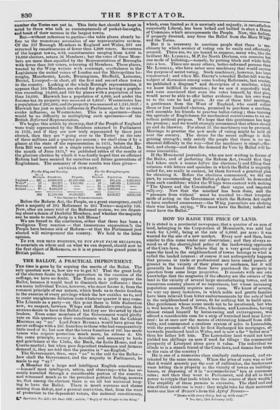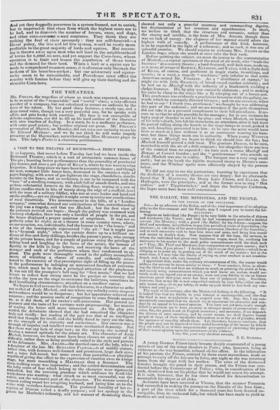HOW TO RAISE THE PRICE OF LAND.
IT is stated in a provincial newspaper, that a quarter of an acre of land, belonging to the Corporation of Monmouth, was sold last week for 1,500/., being at the rate of 6,000/. per acre : it was wanted for the site of a new market. Every now and then, facts similar to this come under our observation ; and they always re- mind us of the shortsighted policy of the landowning opponents of the Corn.laws. We believe that in a very great majority of cases the land in the neighbourhood of towns belongs to what is called the landed interest : of course it not unfrequently happens that persons in trade or professional men have small parcels of ground in the vicinity of their places of residence, but it will generally be found that these have purchased the property in question from some large proprietor. It consists with our own knowledge that the magnates of the cuntry are the owners of the land in the vicinity of several large manufacturing towns, and in numerous country places of no importance, but whose increasing population annually requires more room. We know of several, we may say many instances, in which noble and gentle families have been relieved from bitter embarrassments by the sale of land in the neighbourhood of towns, fit for nothing but to build upon. One gentleman whose name needs not to be mentioned, but who is well known in North Wales, Cheshire, and Lancashire, having almost ruined himself by horse-racing and extravagance, was offered a considerable sum for a strip of wretched land near Liver- pool : lie at once saw the means of extricating himself from diffi- culty, and commenced a cautious system of sales in Lancashire, with the proceeds of' which he first discharged his mortgages, af- terwards purchased land in Wales, and is now a far " better man" than his father left him. The Lancashire land would not have yielded ten shillings an acre if used for tillage • the commercial prosperity of Liverpool alone gave it value. The individual we allude to is a stanch friend of the Corn-laws, and damns free trade as the ruin of the country ! He is one of a numerous class similarly embarrassed, and ex- tricated by the same means. When the price of corn was so low that it would scarcely pay the cost of cultivation, the landowners were letting their property in the vicinity of towns on building- leases, or disposing of it in "accommodation" lots at enormous rates; and then they went to Parliament, and did all in their power to cripple that trade which was the source of their wealth! The stupidity of these persons is excessive. The chief end and aim of their existence is rent : they might take for their universal motto one line of BYRON'S from the Ageqf Bronze— "Down with every thing, but up with rent !"
• Nu. 432; 25th February 1837.
And yet they doggedly persevere in a system framed, not to enrich, but to impoverish that class from which the highest rents are to be had, and to diminish the number of horses, oxen, and dogs, and other corn-consume v-nati creatures. They think they are snaking the best ot their monopoly : they are self-deceived—a liberal policy, the live and let live system, would be vastly more profitable to the great majority of lords and squires. But reason- ing is thrown away upon men who sell land in the neighbourhood of towns for 6,000/. an acre, and yet support the Corn-laws, whose operation is to limit and lessen the population of those towns and the demand for their land. When a lord or a squire can be made to comprehend common sense, it is of course only through the medium of his breeches-pocket ; but our aristocracy and squire- archy seem to be unteachable, and Providence must afflict the country with famine before they will give up their darling and de- structive Corn-laws.



























 Previous page
Previous page